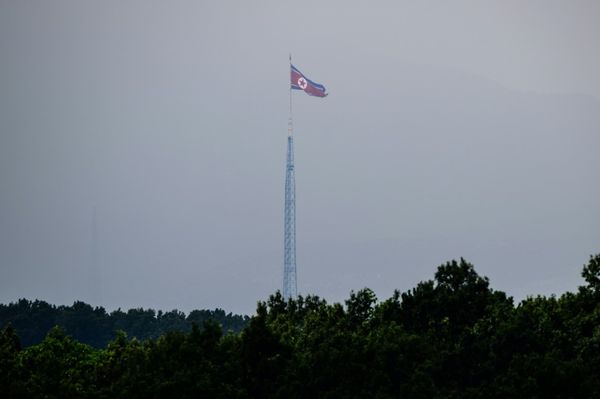
Raisa Malashenko was trundling her rusty bicycle, laden with bags of food, through the centre of Stanytsia Luhanska on Saturday afternoon. The 81-year-old did not flinch as booms of artillery sounded in the distance.
Her five children have all left this frontline town, some for Russia and others for safer parts of Ukraine. “It’s just me and my cow now,” she said mournfully.
Like many older people in eastern Ukraine, Malashenko said she missed the Soviet period, and said she blamed the Ukrainian army and Kyiv’s western backers for the current escalation. But she also said she was terrified of a Russian invasion.
“God forbid the Russians come, and then with them their Cossacks and Chechen fighters will come. Imagine what a hell it will be then,” she said, a tear glistening in one of her eyes.
Over eight years of war, residents close to the frontlines here have become used to the idea that at any time their lives could be altered by a bullet or shell. They even refer to the booms as “badminton” – the sporadic exchanges of fire across the line of control.
In the past week, however, the explosions have been more intense than any time in the past few years, and the targets have apparently been residential areas and even schools.
There are approximately 2 million people living within 12 miles of the frontline, aid organisations estimate, and if the spark for escalation comes in east Ukraine, a new conflict would hit them first.
Stanytsia Luhanska was formerly a suburb of the city of Luhansk, but since the war in 2014 has been cut off from the rest of the city by a frontline. On the other side is the so-called Luhansk People’s Republic – one of two Russia-backed proxy states where Moscow appears to be looking for a pretext to begin military action against Ukraine.

There, authorities called for an evacuation to Russia on Friday – supposedly in advance of a Ukrainian attack but more likely as a pretext for Russia to launch a strike.
Serhiy Haidai, the governor of Luhansk region, said on Saturday plans had been drawn up for the evacuation of women and children on the Ukrainian side of the border too. “Maybe in the coming days we will order an evacuation, if there is an escalation. But if we do it too quickly it will cause panic,” he told the Observer.
In one of many incidents that Ukrainian officials say shows a major escalation from Russia, the Fairy Tale kindergarten in Stanytsia Luhanska was hit by fire on Thursday, injuring two people.
On Saturday, the Ukrainian military flew a group of journalists into the town to help dispel what it said was a false Russian narrative that the Ukrainian army has been behind the recent uptick in violence.
Two ageing Mi-8 helicopters took off from an aerodrome in Kramatorsk and travelled east along the line of control for an hour. The juddering choppers flew low over the barren, brownish east Ukraine landscape, where an unseasonably warm February has melted all but a few isolated patches of winter snow.
Inside the kindergarten, a pile of rubble was still scattered on the floor, incongruous alongside the cartoons and drawings plastering the walls.
“It’s very important for everyone to understand that it’s the Russian Federation that’s behind this. We have no offensive plans … and Ukraine does not want a war,” said Ukraine’s deputy prime minister Iryna Vereschuk, who addressed journalists from inside the kindergarten on Thursday.
Nobody is more fearful of a new war than the locals here, who despite their outward stoicism have suffered terribly during the past years.
“Everyone who lives in the zone near the front has problems with their nerves and almost everyone has serious health problems,” said Larisa Grytsenko, who runs a humanitarian relief centre in the town of Zolote, close to the frontline.
On Friday, her employees were helping 72-year-old Valentyna Melnychenko, whose home in the town of Vrubivka was hit on Thursday morning, destroying her kitchen annexe.
Melnychenko wept as she surveyed the damage. Her pension, she said, was 2,800 hrivnya (£73). She was terrified of renewed hostilities, she said, but had no choice but to stay in her home, where she has lived since 1974 and which is now draughty and damp after the windows were blown out.
“What am I supposed to do, where am I supposed to go?” she asked, wiping away tears. “I’ve lost my husband and my son in the past four years. I have nobody, I’m all alone.”







